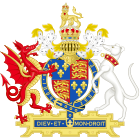Ecclesiastical Appeals Act 1532 facts for kids

|
|
| Long title | An Acte that the Appeles in suche Cases as have ben used to be pursued to the See of Rome shall not be from hensforth had ne used but wythin this Realme |
|---|---|
| Citation | 24 Hen. 8. c. 12 |
| Other legislation | |
| Repealed by | Statute Law (Repeals) Act 1969 |
|
Status: Repealed
|
|
The Ecclesiastical Appeals Act 1532 was an important law passed by the Parliament of England. It is also known by other names, like the Statute in Restraint of Appeals. This law was approved in April 1533. Many historians believe it was a key step in the English Reformation. This was a time when England broke away from the authority of the Pope and the Roman Catholic Church.
The Act was written by Thomas Cromwell. He worked for King Henry VIII of England. The main goal of the Act was to stop people from appealing to the Pope in Rome. Before this law, people could ask the Pope to make final decisions on religious or other legal matters.
Contents
Why the Act Was Created
King Henry VIII wanted to end his marriage to Queen Catherine of Aragon. He wanted to marry Anne Boleyn. However, the Pope would not allow his divorce. To get around this, Henry VIII needed to make sure he had the final say in legal matters in England. This included matters about marriage and the Church.
England's New Authority
The Act declared that the King was the highest legal authority in England. This meant no one could appeal to the Pope anymore. This rule applied to England, Wales, and all other English lands. The Act even said that England was an "Empire." It claimed the English crown was an "Imperial Crown." This idea suggested that England had always been a powerful, independent nation. It did not need outside rulers like the Pope.
What the Act Changed
This new law made it illegal to accept the Pope's authority. It also made it illegal to follow the Pope's decisions on church matters or faith. A year later, the Act of Supremacy 1534 was passed. This second law made King Henry "the only supreme head" of the Church of England.
Everyone in England had to agree to these new laws. If they did not, it was considered a serious crime called high treason. People who committed treason could face severe punishment. For example, Thomas More, a famous scholar, did not accept the King as the head of the Church. The new laws allowed Thomas Cranmer, an important church leader, to finally approve King Henry's divorce. This allowed Henry to marry Anne Boleyn.
What Happened to the Act?
The Ecclesiastical Appeals Act 1532 is no longer in force today. It was officially cancelled, or "repealed," over time by other laws. For example, parts of it were repealed in 1950. The entire Act was finally repealed in 1969 by the Statute Law (Repeals) Act 1969. This means it is no longer a valid law in the United Kingdom.
See also
- Religion in the United Kingdom
- British Emperor (Imperium maius)
- Caesaropapism
- Halsbury's Statutes
- Brexit
 | Charles R. Drew |
 | Benjamin Banneker |
 | Jane C. Wright |
 | Roger Arliner Young |

